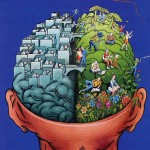 I read a joke on Facebook, a witty play on words:
I read a joke on Facebook, a witty play on words:
My left brain has nothing right,
My right brain has nothing left.
The wit obviously lies in intentionally confusing two pairs of homophones, namely left as a direction and left as the past participle of leave, and right as a direction and right meaning proper and correct.
After a smirk or two, my inquisitiveness compelled me to ask questions. Are these words homophones by chance, or are they actually related to each other somehow?

 For long there has been an article (
For long there has been an article (